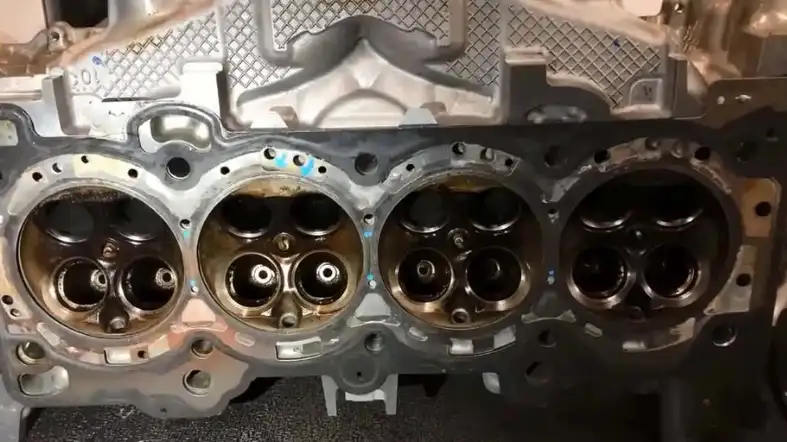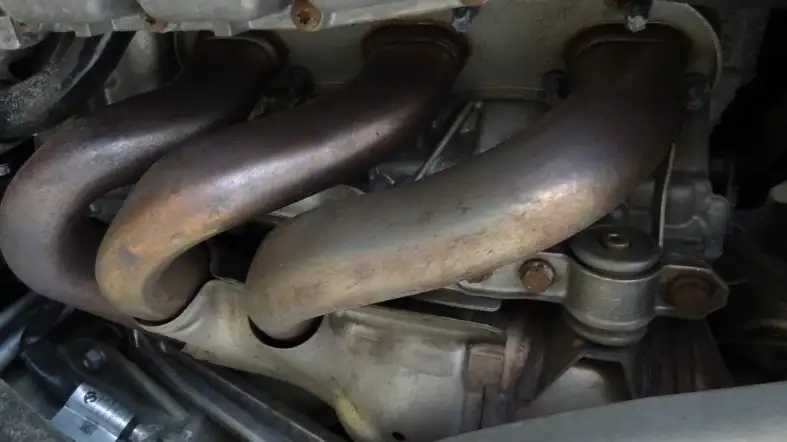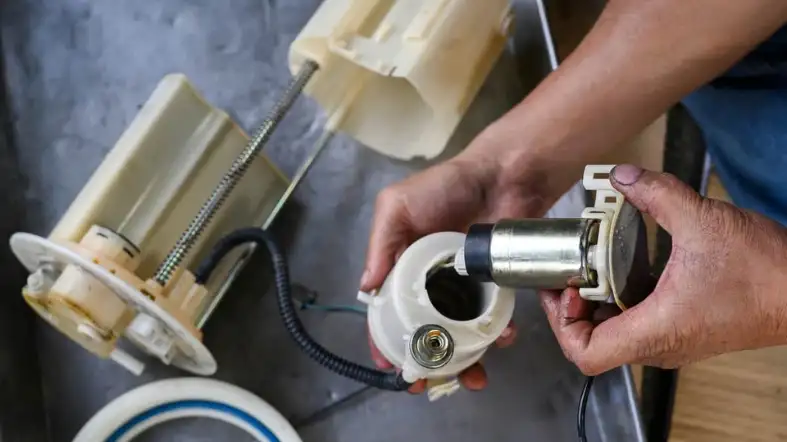Are you a Ford owner experiencing engine troubles? Specifically, issues with the head gasket on your 2.0 Ecoboost engine?
You’re not alone. Many Ford owners have reported head gasket failures on this popular engine model.
In this article, we’ll explore the common problems associated with the Ford 2.0 Ecoboost head gasket and how to prevent and repair them.
As a certified mechanic with over a decade of experience,
Ford 2.0 Ecoboost Head Gasket Problems
The Ford 2.0 Ecoboost engine has had several issues with its head gasket, including coolant intrusion, carbon buildup on valves, overheating, and cracks between the second and third cylinder.

It’s crucial to consider these issues when buying a vehicle with this engine, even though newer versions have fixed some of them.
Top 12 Common Problems in Ford 2.0 Ecoboost Head Gasket
Here are some of the common problems related to the Ford 2.0 Ecoboost head gasket:
Overheating engine
An overheating engine is a clear sign that your head gasket is not doing well.
The head gasket is responsible for sealing the combustion chambers and coolant passages, which helps maintain the engine’s proper operating temperature.
If the engine overheats repeatedly, it can cause the head gasket to fail.
Several factors can lead to engine overheating, including a faulty fan, coolant leak, or a clogged radiator.
Coolant intrusion
Coolant intrusion is a common issue with the Ford 2.0 Ecoboost engine, which may result in a blown head gasket.
Coolant can enter the combustion chamber, leading to white smoke from the exhaust and engine overheating.
If you notice white smoke from the exhaust, it is essential to have the vehicle inspected by a qualified mechanic to determine the root cause of the problem.
Cracked exhaust manifold

The exhaust manifold in the Ford 2.0 Ecoboost engine is known to crack, leading to a loss of power, rough idle, and exhaust leaks.
The exhaust manifold collects exhaust gases from the engine’s cylinders and directs them to the exhaust system.
A cracked exhaust manifold can lead to a decrease in engine performance, including a loss of power and rough idle.
Turbo/boost control solenoid failure
The turbo/boost control solenoid is responsible for controlling the turbocharger’s boost pressure.
A failure in the solenoid can cause a lack of power or boost, rough idle, or engine stalling.
The turbocharger increases the engine’s power output by compressing the incoming air and forcing it into the engine’s cylinders.
If a solenoid breaks, boost pressure can go down, which makes the engine run less well.
Low-pressure fuel pump failure (LPFP)
The low-pressure fuel pump supplies fuel to the high-pressure fuel pump in the Ford 2.0 Ecoboost engine.
A failure in the LPFP can cause a lack of power or a no-start condition.
The high-pressure fuel pump compresses the fuel to a high pressure and injects it into the engine’s cylinders.
If the LPFP fails, the fuel pressure can go down, which makes the engine work less well.
Carbon build-up
Due to failure of Head Gasket Carbon build up occurs. Carbon build-up is a common issue in direct-injection engines, including the Ford 2.0 Ecoboost engine.
Carbon can accumulate on the intake manifold and valves, leading to a loss of power, rough idle, and engine misfire.
The carbon build-up occurs because direct-injection engines inject fuel directly into the combustion chamber, bypassing the intake valves.
This causes a lack of fuel washing over the intake valves, allowing carbon to accumulate.
Carbon build-up can be prevented by using high-quality fuel and regular engine maintenance.
Additionally, carbon deposits can be cleaned using specialized tools and cleaning agents.
Problems with high-pressure fuel pumps

The high-pressure fuel pump in the Ford 2.0 Ecoboost engine can fail and cause a lack of power or a no-start condition.
Symptoms of a failing high-pressure fuel pump include difficulty starting the engine, rough idle, and decreased engine performance.
The high-pressure fuel pump is responsible for supplying fuel to the fuel injectors at high pressure.
A failing high-pressure fuel pump can cause a lack of fuel pressure, which can lead to a lack of power or a no-start condition.
Head gasket failure
A blown head gasket can occur due to coolant intrusion, leading to white smoke from the exhaust and engine overheating.
The head gasket is responsible for sealing the combustion chambers and coolant passages, which helps maintain the engine’s proper operating temperature.
Cracks in the exhaust manifold:
The exhaust manifold in the Ford 2.0 Ecoboost engine is known to crack, leading to a loss of power, rough idle, and exhaust leaks.
The exhaust manifold is responsible for collecting exhaust gases from the engine and directing them to the exhaust system.
A crack in the exhaust manifold can allow exhaust gases to escape before they reach the exhaust system, leading to a loss of power and rough idle.
The exhaust leaks can also cause a loud exhaust noise, and in some cases, the exhaust fumes can enter the passenger compartment, which can be a health hazard.
Other gasket issues:
The Ford 2.0 Ecoboost engine has other gaskets besides the head gasket that can also fail, leading to oil leaks and other problems.
The most common gasket failures include the valve cover gasket, oil pan gasket, and intake manifold gasket.
Symptoms of a failing gasket include oil leaks, decreased engine performance, and rough idle.
If the gasket is not replaced promptly, it can lead to more severe engine damage.
Oil leaks:
Oil leaks can occur in the Ford 2.0 Ecoboost engine due to faulty gaskets or seals, leading to a loss of oil and possible engine damage.
The most common areas for oil leaks include the valve cover gasket, oil pan gasket, and rear main seal.
Symptoms of an oil leak include oil spots on the ground under the vehicle, a burning oil smell, and a low oil level on the dipstick.
If the oil leak is not addressed promptly, it can lead to engine damage due to a lack of lubrication.
Coolant leaks:
Coolant leaks can occur in the Ford 2.0 Ecoboost engine due to faulty gaskets or seals.
Coolant leaks can cause a loss of coolant and possible engine damage.
Regular inspection and replacement of faulty gaskets and seals can prevent coolant leaks and prolong engine life.
FAQs
What Is A Ford 2.0 Ecoboost Head Gasket Problem?
It’s a common issue where the head gasket in the 2.0 Ecoboost engine of Ford vehicles fails, causing oil leaks, coolant loss, overheating, and engine damage.
How Can I Identify If My Ford Vehicle Has A Head Gasket Problem?
Look for signs like white smoke from the exhaust, engine overheating, loss of coolant, oil mixed with coolant, or a milky substance on the oil dipstick.
Get a professional diagnosis if you suspect any of these symptoms.
What Causes The Head Gasket To Fail In A Ford 2.0 Ecoboost Engine?
The head gasket may fail due to a variety of reasons such as overheating, engine misfires, poor maintenance, incorrect installation, or factory defects.
Can I Fix A Ford 2.0 Ecoboost Head Gasket Problem Myself?
It’s not recommended to fix the head gasket problem yourself as it requires expertise, specialized tools, and knowledge of the engine’s intricacies.
Leave the repair job to a professional mechanic.
How Can I Prevent Head Gasket Problems In My Ford 2.0 Ecoboost Engine?
Regular engine maintenance and inspections, avoiding overheating, and using high-quality engine oil and coolant can help prevent head gasket problems in your Ford 2.0 Ecoboost engine.
Conclusion
The Ford 2.0 Ecoboost head gasket problems have been a major concern for many vehicle owners.
These issues often manifest in the form of coolant leaks, engine overheating, and poor engine performance.
If you own a Ford vehicle with this engine, it’s important to be proactive in maintaining it by regularly checking the coolant levels, monitoring the engine temperature, and scheduling routine maintenance with a trusted mechanic.
By taking care of these problems as soon as you notice them, you can keep your engine from getting worse and save money on repairs.
Remember, regular maintenance and repairs keep your car running smoothly and reliably for years.

